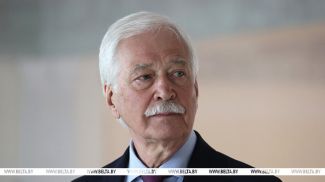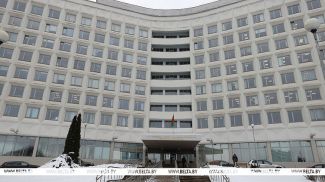MINSK, 14 September (BelTA) – The readiness of the healthcare system for the autumn epidemic season and a new wave of COVID-19 was discussed during the government conference hosted by the Council of the Republic of the National Assembly of Belarus on 14 September to discuss the counteraction of the spread of the coronavirus infection in the regions and Minsk, BelTA has learned.
Chairwoman of the Council of the Republic of the National Assembly of Belarus Natalya Kochanova is the head of state's authorized representative for the city of Minsk and oversees healthcare matters. The senator explained that all those in charge of overseeing the COVID-19 situation in the regions – representatives of medical universities, healthcare institutions, and the Healthcare Ministry – had been invited to participate in the conference.
Natalya Kochanova told participants of the conference: “We see that the incidence rate is climbing, including due to the growth of other seasonal diseases. We should be ready for it. What questions do you have regarding medications, personal protective gear, spare beds in hospitals, and the availability of oxygen? I'd like you to present all the questions you may have today.”
Vladimir Karanik, Chairman of the Grodno Oblast Executive Committee, head of the interregional staff in charge of preventing the spread of the coronavirus infection in Brest Oblast and Grodno Oblast, said: “The situation is controllable in the regions. We've accumulated the experience, which allows responding, evaluating, and forecasting the situation. We are now entering a season when the incidence rate of acute respiratory infections rises. Coronavirus is one of them. The incidence rate has yet to reach last year's peaks for now.”
In his words, efforts are primarily channeled into continuing the vaccination campaign and into protecting the most vulnerable population categories: the elderly and people with chronic diseases. “I am very glad that Grodno Oblast and Brest Oblast have already hit vaccination targets as far as healthcare and social security workers are concerned. It reduces the risk of uncontrolled propagation of the infection in the most vulnerable group,” Vladimir Karanik added.
The epidemic service is now working harder. Control has been stepped up over the observation of antiepidemic measures and sanitary and epidemiological measures.
Vladimir Karanik said: “The immunity layer allows us to hope that incidence rate figures will be lower than last year. On the other hand, we understand that the delta strain with its higher virulence is prevalent now. On the whole, there are no prerequisites for the situation to get out of control.”
Vladimir Karanik remarked that the new type of the coronavirus very slowly shows seasonal fluctuations (an upsurge in spring and autumn) but has yet to lose qualities of a pandemic strain.
It was no accident that representatives of medical universities had been invited to attend the conference. They actively helped and continue helping the healthcare system with fighting the new type of the coronavirus. Lecturers of the universities help by offering instructional aid and consultations to hospitals all over the country. Students of the universities are about to start helping on a large scale, too, Vladimir Karanik stated.
Dmitry Danilov, Professor of the Infectious Diseases Department of the Belarusian State Medical University, stated that Belarusian healthcare workers have learned a lot and the physical infrastructure of healthcare institutions has improved a lot. “But the structure of the disease incidence is changing. This is why we cannot relax. I would like to particularly draw attention of the population to vaccination, to the need to wear masks and obey distancing rules,” he said.
Vaccination protects by reducing the possibility of catching the disease and by reducing the gravity of the disease if the person becomes infected. Those, who have already recovered from the disease, should also get vaccinated because the antibodies do not last forever. “Think not only about yourself. We should think about each other, about our friends and families and the people around us. It will at least help the medical community fight the infection,” Dmitry Danilov said.
The professor recommends using any vaccine. He pointed out that excellent conditions for COVID-19 vaccination are available in Belarus: vaccination stations are open not only in clinics but in shopping centers as well.













